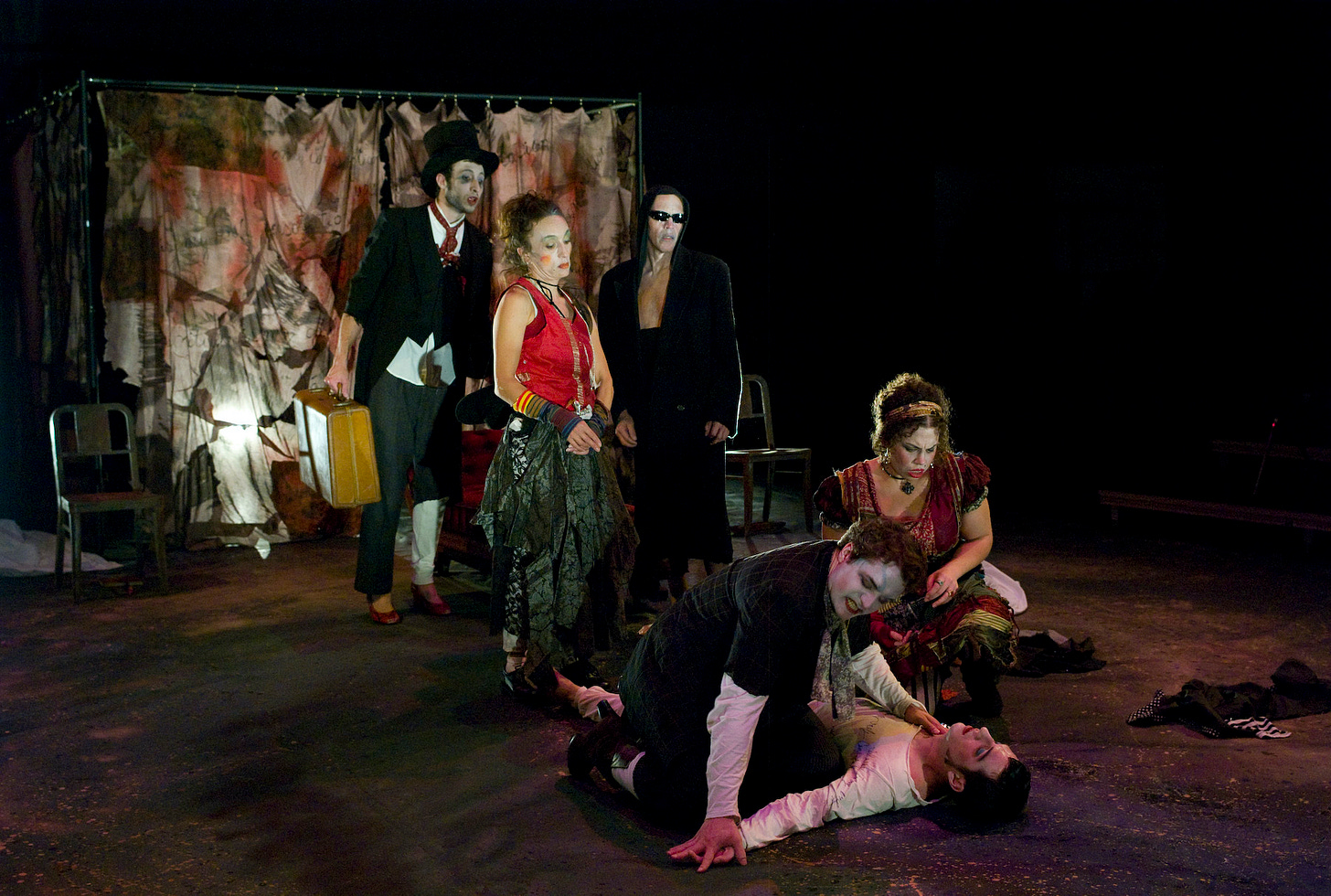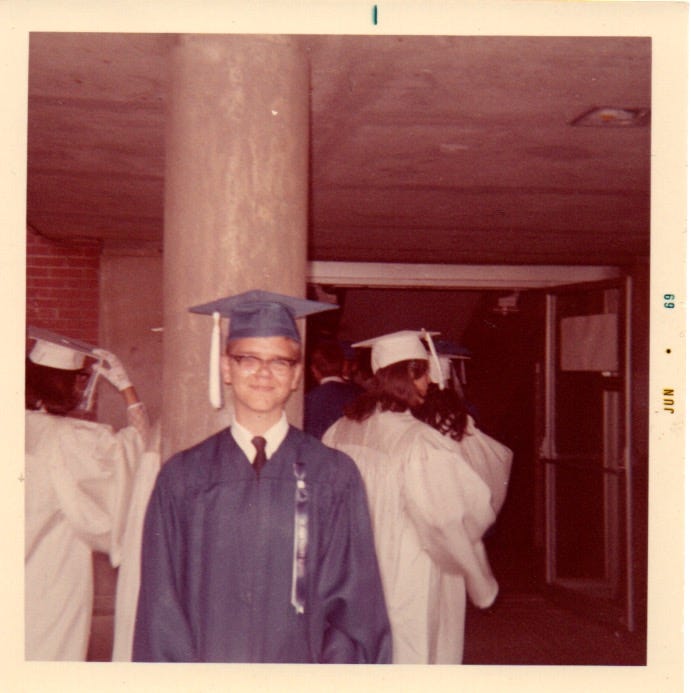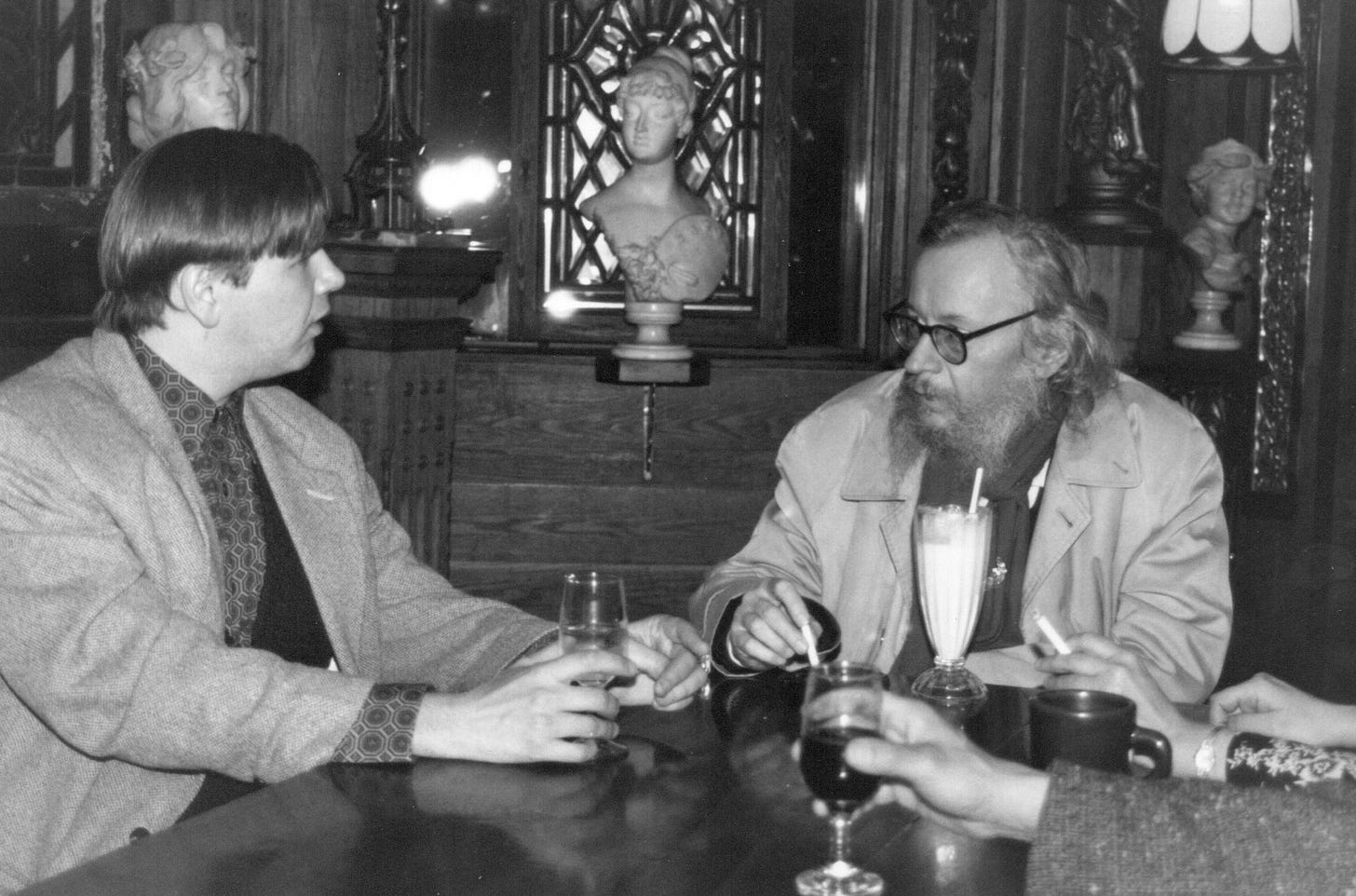One year ago, NWPL premiered Al otro lado del rio (Across the River), Jairo Cuesta’s solo performance, at the Balch Street Theatre in Akron, Ohio. Since that performance closed in April 2021, I have not set foot in a rehearsal room or participated in a production meeting; I have not opened a book or browsed the internet with the intention of preparing to direct a new theatre event. I tell people that I’m on a sabbatical from theatre. It’s been a long time coming.
Spring 1969. I’m sitting in my eighth grade classroom at St. John Vianney, in the suburbs of Chicago. Today, we select our classes for freshman year of high school. Sister Denise, one of my favorite teachers ever, passes out the forms to those of us who will be attending the public school, West Leyden, a beautiful, modern campus, only a block away from my house. I carefully fill in my choices: College Prep English, World History, Early-bird Algebra 1, Biology, and Physical Education. The sun shines brightly through the classroom windows and hits my desk. I turn to gaze towards the empty playground/parking lot outside. I still need to pick two electives. I had no idea, on that sunny spring afternoon, that the two choices I made would determine much of my future course in life.
I stare dreamily out the window, button the cuffs of my blue uniform shirt, straighten my black continental bowtie with faux pearl snap, and turn back to my form, back to my future. I scan the list of electives. Anyone preparing for college is required to study a foreign language. My older brother is taking German, so that’s out. Most of the other kids are signing up for Spanish— but I don’t like to do what everyone else is doing. So that leaves Russian and French. As I’m about to check the box, Sister Denise announces that Russian is no longer being offered and we should cross it off our form. It’s 1969, after all, and while it’s not thawing, the Cold War is in a very deep freeze. I guess Russian speakers are no longer in demand. So the choice is French, by default. Where would I be right now if I had taken Russian? Hmm…
The second elective. What happens next is like what psychologist James Hillman describes in his book, The Soul’s Code: In Search of Character and Calling. Without any predetermination on my part, without any planning, my destiny, my daimon, takes control of the situation, and this geeky, nerdy, bowtie-wearing, 14 year old, signs up for Freshman Drama—instead of Band.
You see, my dad was a musician. He played trumpet, drums, and concertina. And anything else that anyone handed him. My older brother had been in band since fifth grade and played clarinet and guitar. My godmother played the organ and conducted the choir at church. (She also never married and was the same priest’s housekeeper for 50+ years. But that’s another story.) My godfather played saxophone, and a lot of the cousins (on my dad’s side) were musically inclined. My musical training had been postponed for various reasons, but now that I was entering high school, the opportunity to learn to play a musical instrument lay before me and it was expected that I would grab it. There was no discussion, no question—Jim would be in the band in high school.
I go home after school prepared to face my father’s wrath. We sit around the dinner table that night and I list the classes I will be taking in the fall. I deliberately leave out Drama. My dad asks, “And what about band?” I swallow hard. “I signed up for Drama instead,” I croak. “What?” He looks at me sternly, for a long time. “Well, next year, you’re gonna take band.” And that was it. My daimon begins to bud. And next year never comes.
It seems that I have either been in rehearsal, preparing for rehearsal, recovering from rehearsal, or confronting the terrors and joys of performance since that surreptitious decision in 1969. I have studied and practiced, researched and refined my craft. I have been praised and panned, worked in all kinds of conditions, and in many different cities and countries. I started a theatre company right out of college in the stimulating arts atmosphere of the Twin Cities. I went to graduate school in California for directing. I was apprentice to and assisted one of the modern masters of the art form, Jerzy Grotowski. I met my partner and closest collaborator, Jairo Cuesta. My life in the theatre has been a marvelous adventure. For 50 some years—without a break—my daimon blossomed and then bloomed. And now, I’m taking a sabbatical.
However, although I may be taking a sabbatical from doing theatre, I have not refrained from seeing theatre. Since settling in Paris in July 2021, Jairo and I have attended a wide variety of performances, including works by the foremost directors of the Classic Avant-Garde: Peter Brook’s staged reading of Samuel Beckett’s Happy Days, featuring the phenomenal Kathryn Hunter (who played the Weird Sisters in the recent film, The Tragedy of Macbeth); Robert Wilson’s Jungle Book; Ariane Mnouchkine and the Théatre du Soleil’s dream-like homage to Japan, L’île d’or; and Peter Sellars’ remarkable mise en scène of the medieval text, Le Roman de Fauvel, with singing by the early music ensemble, Sequentia.
We’ve also seen performances by the new generation of directors: Christiane Jatahy’s stage adaptation of Lars Von Trier’s film, Dogville; Sylvain Creuzevault’s The Brothers Karamazov; and Caroline Guiela Nguyen’s post-Rapture epic, Fraternité, conte fantastique. Not to mention the current darling of European directors, Ivo Van Hove, and his version of The Oresteia. There was also a superb dance performance by an Italian friend, Alessandro Bernardeschi; a traditional Thai dance troupe; a festive American Christmas carol musical revue; and a devised play by youth from the region of Chocó in Colombia in collaboration with urban youth from a Paris banlieu (suburb). Whew! It makes me tired just listing them all. That’s quite a lot of theatre to digest in less than nine months.
All of those years doing theatre, I was often asked: Why Theatre? Oh, I had plenty of pat answers prepared, like playwright David Mamet’s theory that theatre is to society as dreams are to the individual.” “Theatre artists are the dream makers of society,” I would tell my students. “Without theatre, society becomes sick.” Or psychoanalyst and critic Julia Kristeva’s idea that theatre is soul-space. The theatre is where humans go to cure their “new maladies of the soul.” My favorite lofty sentiment that I wove over the years was that in this post-human age, theatre is the place where we will go to re-member—to re-member what it is to be human. I still kind of like that one.

In these last months of only being a spectator, I find myself asking the question anew: Why Theatre? In the rehearsal room, everything made sense to me. The challenges, the breakthroughs. In the relations between the director and the actors something precious and deep can be discovered and nurtured. A meeting occurs that goes beyond social behaviors. Grotowski speaks about this phenomenon elegantly in his book, Towards a Poor Theatre:
There is something incomparably intimate and productive in the work with the actor entrusted to me. He must be attentive and confident and free, for our labor is to explore his possibilities to the utmost. His growth is attended by observation, astonishment, and desire to help; my growth is projected onto him, or, rather, is found in him—and our common growth becomes revelation. This is not instruction of a pupil but utter opening to another person, in which the phenomenon of “shared or double birth” becomes possible. The actor is reborn—not only as an actor but as a man—and with him, I am reborn. It is a clumsy way of expressing it, but what is achieved is a total acceptance of one human being by another.
As a director, I passionately follow the actor’s thread of life, their impulses, transformations, and revelations. But as a spectator, I am often left out of this process and what remains are only special effects and little else. I go to the theatre seeking a connection. I look for some kind of opening, a call, an invitation, that allows me to enter deeply the work of the artists involved. Actually, I think I’m looking to fall in love. Yes, that’s it. In all of those many rehearsals, I was falling in love over and over again, relishing the “utter opening” that Grotowski describes. Now, as a spectator, if the artists are only showing me the results of their work, there’s no way for me to connect, to enter their process, to become intimate with them. Only twice in these last months did I have an authentic experience in the theatre: with our friend Alessandro’s dance performance and with Peter Sellars’s medieval masterpiece. Both worked for me as theatre—as a meeting place and laboratory of the human condition. And I left the theatre changed—and charged. There was less of me—with fewer boundaries and defenses. I was empty, but full—full of more space. Is this Kristeva’s soul-space? Or is it what I have sometimes called Authentic Space. Or maybe—I simply fell in love?

I want more of these experiences in the theatre—as a spectator. I’m not ready yet to go back to doing theatre. But during this time away, I will continue to look for Authentic Space—to enter the process, to connect with the words and actions of the actors, to follow the thread through the labyrinth. To fall in love—and to always ask the question: Why Theatre?
Addendum: Paris is certainly an exceptional place to see theatre—and dance—and circus—and almost any other kind of live performance. It’s also the 400th anniversary of Moliere’s birth and the Comédie Française, France’s national theatre, is currently staging all of his plays in repertory. Ivo Van Hove has directed The Tartuffe and it’s been filmed and is showing in movie theaters all over the world. We have not yet seen any of the Moliere plays, but one or two are on our list. I will let you know as we encounter more performances this spring and summer.
Thank you for your attention.
You can read about Jerzy Grotowski in the book that Jairo and I wrote as part of the Routledge Performance Practitioners series: Jerzy Grotowski by James Slowiak and Jairo Cuesta (Routledge, 2018).
You can read more about Julia Kristeva’s theories of soul-space in New Maladies of the Soul by Julia Kristeva (Columbia University Press, 1995)
and more of David Mamet’s thoughts on theatre and dreams can be found in his book Writing in Restaurants: Essays and Prose (Penguin Books, 1987).










Wow, I don’t remember. I may have the program somewhere still. If I find out I’ll definitely let you know.
That Grotowski quote rings true tonight as I slog through yet another grant application. I love reading your thoughts as you experience life renewed in Paris. Miss you and Jairo!